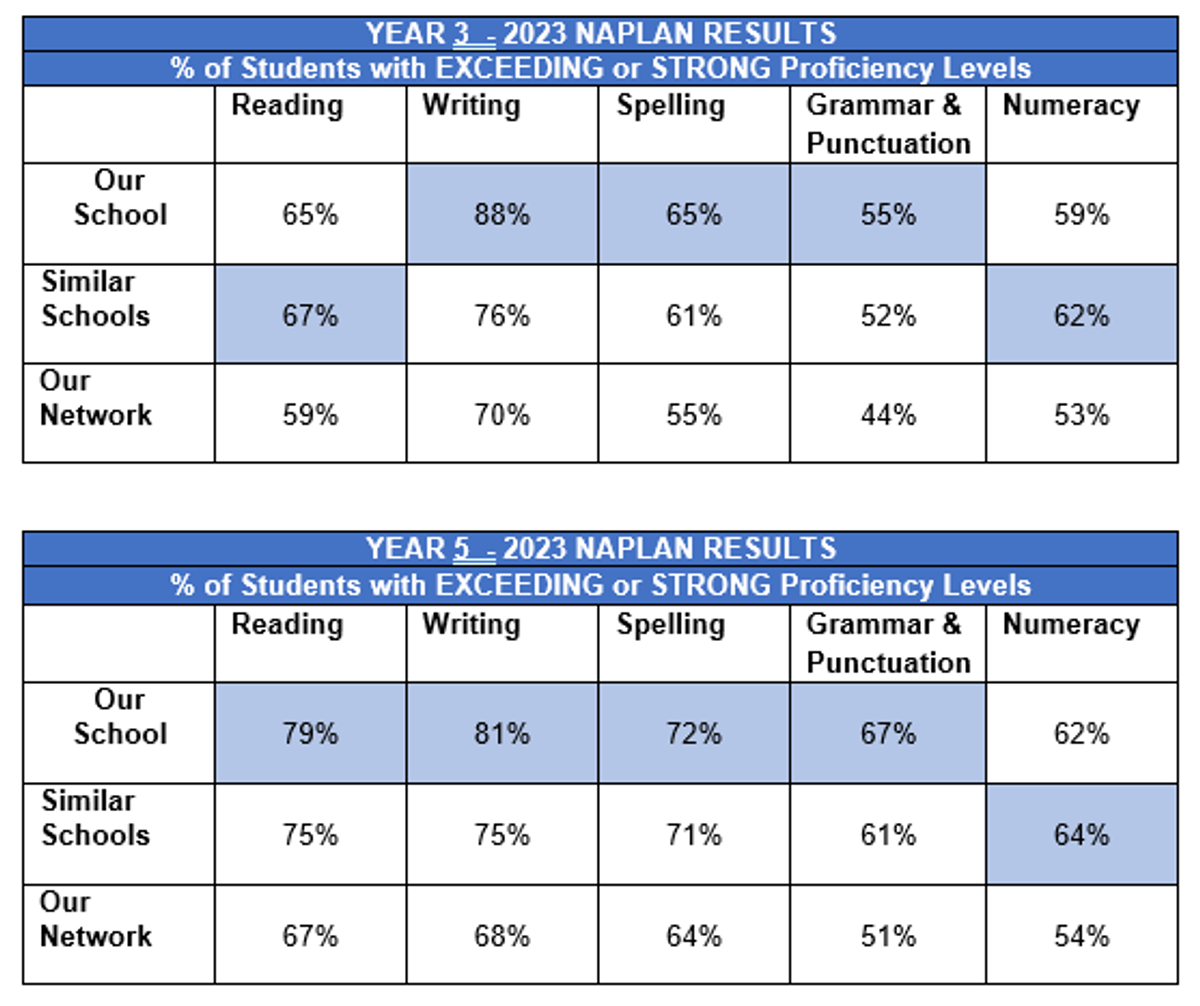Principal's Update
Angelika Ireland

Principal's Update
Angelika Ireland


Congratulations! This week our Foundation students celebrated 100 days of schooling. What a lot of learning has occurred in such a short time! These students have begun reading, know their letters and sounds, can write sentences/stories and engage knowledgeably in Maths activities. Also, importantly, they have learnt to work together in groups, co-operate with each other and demonstrate our school values of Respect, Responsibility, Resilience, Honesty and Learning.






In Term 1, our Year 3 and Year 5 students participated in NAPLAN testing. Tests covered the areas of Reading, Writing, Spelling, Grammar and Punctuation and Numeracy. This year the testing was all on-line except for the Year 3 Writing. Results were recently available and NAPLAN Student individual Reports have been sent home.
This year, student achievement in NAPLAN is reported using proficiency standards for each assessment area at each year level. The standards are set at a challenging but reasonable expectation of what students know and can do at the time of testing. There are 4 proficiency levels:


We are really pleased with the overall achievements of our students with only a very small number requiring Additional Support.
The 2023 Parent/Caregiver/Guardian Opinion Survey (PCGOS) will be open for parents/caregivers/guardians to complete between Monday 7th August and Friday 8th September.
The survey is designed to assist schools in gaining an understanding of families’ perceptions of school climate, student behaviour, and student engagement. We invite all families to take part in the survey and provide feedback.
Watch for a Compass post which will be sent out with a link.
If your child feels anxious, reassure them that these feelings are a normal response to new people, events or potentially challenging situations. Help your child understand that there is a great deal they can do to manage their anxious feelings, so they can get on with the activities they enjoy.
Explain anxiety
If your child is anxious he may struggle to explain how he feels. An important first step in anxiety self-management is explaining to your child how anxiety works.
Help recognise anxiety-inducing events
There are many things that can evoke anxiety in your child, including:
Help your child to recognise the specific situations and events that make them feel anxious such as meeting new friends, sitting tests and fear of rejection. In this way you can help your child manage and minimise their feelings of anxiety.
Respond with empathy
When your child feels anxious, the part of the brain that controls rational thinking, decision-making and concentration temporarily goes offline. They can feel easily overwhelmed by simple, everyday events and situations. Rather than protecting your child by allowing them to avoid meeting these challenges, or dismissing them as trivial, validate their feelings with statements such as:
Resist the temptation to rescue or fix a situation. Respond with empathy and understanding to your child’s concerns.
Manage anxious moments
Help your child develop the tools to regulate and push their anxious feelings to the background. Practise these anxiety management tools when your child is feeling calm, and it will be easier for them to practise when they are nervous. These include:
Get the fundamentals right
Sufficient sleep, good nutrition and exercise are essential for anxious kids. Support your child to adhere to their optimal bedtime so they wake naturally each morning, reduce sugar, take care of their gut health through good nutrition and encourage regular exercise for optimal mental health. There is a great deal you can do to help your child manage their anxiety. Start by assisting your child to understand the fundamentals of anxiety, show your genuine understanding of their feelings and be ready to support them emotionally to push their anxiety to the background.
(Ref: Parenting Ideas)
Food for Thought


Angelika Ireland